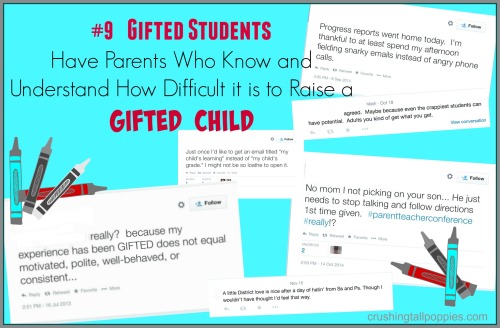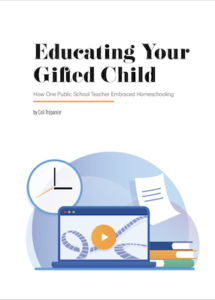#9 Gifted Students Have Parents Who Know and Understand How Difficult it is to Raise a Gifted Child

Kindergarten Teacher 1: I had Suzy’s mom come talk to me after school today. Oh gawd, I hear this every year.
Kindergarten Teacher 2: What did she say?
Kindergarten Teacher 1: (with eyes rolling) She said Suzy is bored and that she thinks her child must be gifted. EVERY parent thinks their child is gifted. Their child can’t sit still and goes home complaining of boredom and, BOOM, they think their child is gifted. (rolls eyes again) The child just needs to learn to sit still and pay attention!
Raising a gifted child is difficult. Parents who have a gifted child are likely stressed and a bit frazzled from the day to day experience of raising their child. When they come to school with concerns about their gifted child, these concerns are usually real. Gifted children do not have it made, and neither do their parents. Yes, it may seem many parents want to believe their child is gifted, and the few parents who seem to often brag about their child’s giftedness probably have a high-achieving child, not a gifted child. The worried parent who comes to talk to you about their gifted child is not there to brag, but likely has genuine concerns for their child because they know that true giftedness is complex and never easy.
Not every parent who comes to you, their child’s teacher, is clueless.
I have been on both sides of this fence—as a public school teacher and as a parent of a gifted child. As a teacher, I also engaged in the ugh, that parent teacher talk. I’m on the other side now and it is no bowl of cherries over here either. The parent-teacher relationship is a very strained one indeed, especially when it comes to giftedness, which is why I included it in my “A Gifted Child Checklist for Teachers” as #9.
I did my homework for this article and while researching, I came across something quite interesting. I had read various articles before my research, all with similar titles referring to things that teachers want parents to know. Fair enough. Parents need to understand the many difficulties teaching encompasses, and many do. To review these types of articles, I googled the words, things teachers want parents to know, and there was 5+ pages of search results all with titles heralding the things teachers want parents to know, to say, not to say and to do.
Then I flipped the search and googled things parents want teachers to know. The first few search return entries showed articles with titles reflecting the things parents want to tell teachers, and then after the first three, the search results quickly returned to articles and blog posts heralding the things teachers want parents to know. I continued my research about the prevalent, friction-filled parent/teacher relationship across a few social media sites—Twitter, Facebook and Pinterest. I found a lot of animosity especially from teachers towards parents, sadly.
Being a teacher is a difficult and stressful job. I get that because I taught in many a classroom. Now, I am in the emotional trenches of raising a highly gifted child who was, like many gifted children at traditional schools, completely misunderstood. As far as stress goes, parenting a highly gifted child has been more stressful than my worst teaching assignment, and I am hardly alone here. And most of my stress came from dealing with his traditional schools and their misunderstanding of giftedness.
From among the many, many parents of gifted children I have communicated with in the last few years as a writer, as a parent of a gifted child and as a gifted advocate, I see over and over the belief among the parents of gifted students that schools and teachers are too often very flippant and evasive when communicating with parents. But, if parents and teachers are to work as a team, parents need to be respected, too. Don’t let a few bad apples spoil the whole bunch of us parents, especially those of us who really do have gifted children!
And when we dare to utter the heinous, uber-forbidden word bored to our child’s teacher, maybe, just maybe, our gifted child is truly bored and needs more challenging work. If our child can’t sit still, he may not have ADD or ADHD—he may just need a more appropriate education. For a gifted child with a voracious need for more information, deeper learning and all at a quicker pace, sitting, and sitting some more, through multiple repetitions of skills and facts he has already mastered can trigger improper classroom behavior, and yes, boredom.
As a former teacher and now a mom of a gifted child, my suggestion is for teachers to listen, really listen to parents’ concerns and not be quick to judge—to judge them or their child. Parents are not always misguided, and gifted children aren’t always perfect little students. Things aren’t always what they seem on the surface.
In my blog post “A Gifted Child Checklist for Teachers” , from August 22, 2014, I listed ten basic characteristics and traits of gifted children intended to help teachers and others to identify giftedness in children by providing a list of gifted traits and characteristics which aren’t always so well-known, easily recognized or widely understood. I also hoped my checklist would dispel some myths and correct some incorrect information about giftedness.
RELATED RESOURCES FROM MY RESEARCH:
Why are we so nervous about parents?
Why some teachers just don’t “get it” about gifted education
What Parents Really Want to Tell Teachers: What You Do Hurts Our Children
What Parents Want Teachers to Know
3 Things Parents Wish Teachers Knew: We Can Handle the Truth
What teachers really want to tell parents
Secret Parent: 10 things we’d like to say to teachers
Teacher confessions: 5 things parents do (but shouldn’t…ever!)
 Crushing Tall Poppies
Crushing Tall Poppies



Pingback: A Gifted Child Checklist for Teachers | Crushing Tall Poppies
Unfortunately, I’ve encountered more than one teacher who takes it as a personal offense that my child is gifted. My PG son’s 5th grade teacher was so annoyed at his advanced knowledge of math, and my constant request for level-appropriate work, that she finally gave him her HS son’s trigonometry homework and said “here, smarty pants” Not only did he complete it, but she was unable to correct it–which only annoyed her further.
Oh, wow, Lauren! That is sad and funny at the same time. It is sad that we have teachers like that. But, HOORAY for your son for completing the trigonometry! Thank you for sharing your story, Lauren.
As both a teacher and a parent of a gifted child, this article speaks to me. While I had not taught gifted students before, I do find myself on the defensive mode when parents demand more. It is only after being a parent that I understand where they are coming from.
Sarah,
I know exactly what you mean. I really think more teacher training on giftedness in children would go a long way to remedy the disconnect here. It has got to change because too many gifted students are being left behind and hurt. Thank you for sharing your thoughts!
Fantastic post, Celi! I could relate to every single word.
For years, I hesitated to use the term “gifted.” It is thrown about too much. Then I found the term “Twice Exceptional” which fits my son to a T. In order to try to get proper services, I have learned to embrace the idea and selectively use the term. Having had the LD recognized first, the school district is not set up to deal with 2E so gifted it mentioned more frequently.
“The worried parent who comes to talk to you about their gifted child is not there to brag, but likely has genuine concerns for their child…” This really says it all. Many teachers don’t recognize the hesitation and anxiety many parents feel about approaching them and being a nuisance. And they worry that the teacher’s frustration with them will be taken out on their child.
Parents and teachers need to be able to collaborate together to educate gifted children. We have to figure out how to be allies together rather than suspicious adversaries.
Great article!
Thank you, Gail!